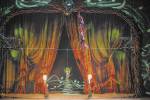Tuneful Tales
Meat Loaf changed some of the lyrics to Bon Jovi's "Elvis in Vegas" when he covered the song, which is the emotional closer for his new album, "Hang Cool, Teddy Bear."
Meat Loaf wanted it to be more upbeat.
It's a story song about a 15-year-old who travels to Las Vegas to see Elvis Presley. Bon Jovi's original is bittersweet, balancing a boy's dreams with an older man's resignations. Meat Loaf's version is bittersweet but ends with the line, "His dreams came to life that night."
"If you're gonna get out of your bedroom in New Jersey, and drive all that far, your dreams better come to life," Meat Loaf tells me.
"I wanted his experience to be bigger than what he anticipated it to be," Meat Loaf, 62, says.
"And it's a Hollywood ending. You want the audience to feel good about it."
Meat Loaf says changing just a few words matters. And there's been no fallout.
"Nobody's said anything to me," Meat Loaf says.
He says the song's definitely in Jon Bon Jovi's wheelhouse. It's Bon Jovi's after all. But five years ago, Bon Jovi handed it over to Meat Loaf, knowing Meat Loaf could "make the characters real," he says.
"Jon said, 'There's only one person who can actually sing this song -- Meat Loaf.' And I said, 'Yep, and I've got the Brooklyn Bridge for ya for a buck,' " Meat Loaf says.
NO POLITICS -- EXCEPT FOR PROMOTIONS
Meat Loaf has promoted his new album and tour on many TV shows, including Fox News' Mike Huckabee show.
He likes Huckabee personally, but don't draw any political inferences from that or his TV appearance, he says.
"I went on 'Larry King,' " too, he says. "I'm trying to promote a record. People look at Fox News and say, 'Oh, it's political. MSNBC is political.' Hey, I will go anywhere. I don't care. I'll go to the Greek Orthodox channel!"
In fact, Meat Loaf is opposed to performers' talking politics in songs and onstage, "when people start preaching."
"People began to stand on pulpits and preach" in their music or on tour, he says.
As an example, he points to the old Australian band Midnight Oil.
"I wasn't a fan of Midnight Oil because they were a political band. I was a fan of the lead singer, because he believed what he believed. Now he's a politician.
"But," Meat Loaf says, "I'm just not a fan of the political message in music or onstage. I think if an audience pays to see a show, that's not the time or place for a political statement. I think artists are completely wrong in doing so."
Mixing politics and music insults fans, he says.
"If you want to make a political statement, make it in another way. Don't make it in front of people who paid, in some cases, $500 a ticket. You're gonna stand there and start preaching politics to them? I would stand up and say, '(Expletive) you.' "
Meat Loaf says his anti-political message applies to politics of all stripes -- left, right or center.
"I don't mind the politics they have," he says. "I don't want to see somebody running for office up there."
TELLING yOur life with his SONG
Meat Loaf is a storyteller singer, as anyone knows from his hits "Paradise by the Dashboard Lights," "Two Out of Three Ain't Bad" and "I'd Do Anything For Love (But I Won't Do That)."
So I asked him who his favorite storyteller singers have been.
Answers: Harry Chapin, Sammy Davis Jr., Dean Martin, Frank Sinatra, Mick Jagger, Rod Stewart, Freddie Mercury, Billie Holiday and the Beatles.
As songs go, he cites "New York, New York" as a good example of a storytelling song.
" 'New York, New York' is character-driven. You really get the feeling this guy loves New York," he says.
He even brings up some really old-school storytellers.
"The minstrels (were) traveling around, going from (royal) court to court, telling stories about other courts.
"Whether they were made up or not -- whether they were exaggerated or not -- it was about storytelling. That's how music started. That's how drawing started on the walls in caves. It was about telling a story."
Storytelling was no less important at the beginning of rock 'n' roll songs, he says.
"In the '50s, when they had real rock music, look at the ones that were huge -- 'Teen Angel,' 'Running Bear,' 'Little Deuce Coupe' ... 'Mustang Sally.' It just keeps going."
Doug Elfman's column appears Sundays, Mondays, Tuesdays and Fridays. E-mail him at delfman@ reviewjournal.com. He blogs at reviewjournal.com/elfman.
Preview
Meat Loaf
8 p.m. today
The Joint at the Hard Rock Hotel, 4455 Paradise Road
$39.50-$49.50 (693-5583)




























